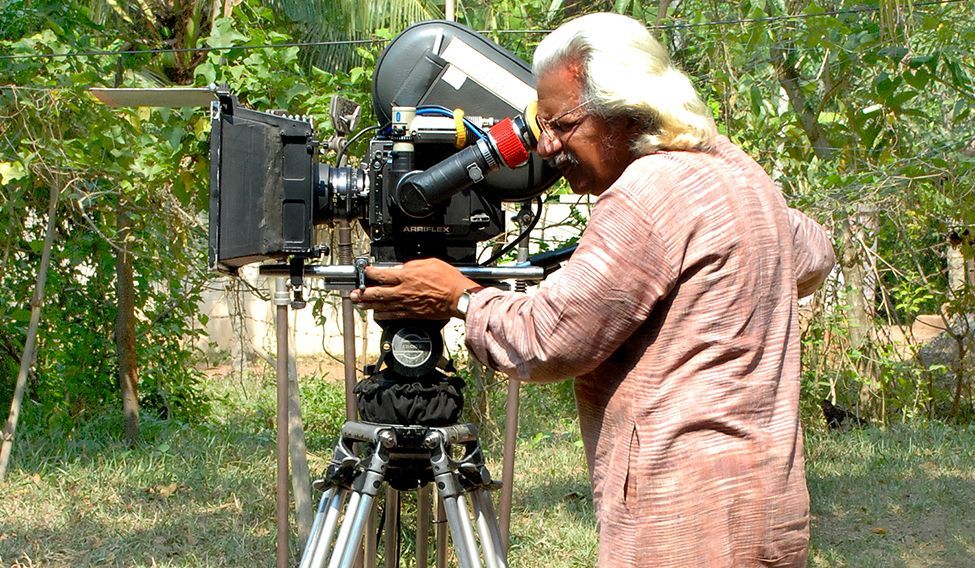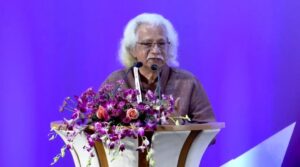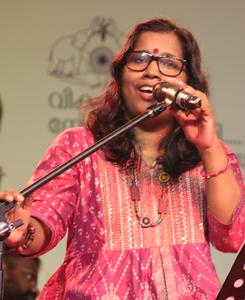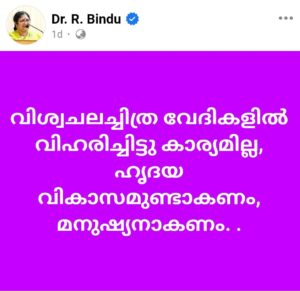The controversy Adoor triggered shows no signs of dying down. A flurry of responses — both in support and against — continues to keep the issue alive in the public sphere.
Published Aug 05, 2025 | 3:00 PM ⚊ Updated Aug 20, 2025 | 9:45 PM

Adoor Gopalakrishnan further stirred the debate by suggesting that the delegate fee for the International Film Festival of Kerala be hiked to deter casual attendees.
Synopsis: Acclaimed Malayalam filmmaker Adoor Gopalakrishnan has sparked a controversy, saying recipients of a government grant of ₹1.5 crore — provided to those from SC/ST communities and women — for making movies should undergo at least three months of intensive training. He also suggested slashing the amount to ₹50 lakh so that it could be distributed among three movie directors.
Few names in contemporary Indian cinema have commanded the kind of international respect and recognition that Adoor Gopalakrishnan commands.
A pioneer of the parallel cinema movement, Adoor — as he is popularly known — elevated Malayalam cinema to global stages, winning accolades that brought pride to both Kerala and the nation.
But in striking contrast to the visionary spirit of his films, Adoor’s recent remarks reflect a disappointingly narrow mindset — a dissonance that echoes the adage, even those we place on pedestals may stand on feet of clay.
The controversy he triggered shows no signs of dying down. A flurry of responses — both in support and against — continues to keep the issue alive in the public sphere. The debate has spilled into Kerala’s cultural and political arenas, with even ministers taking divergent stands, deepening the divide.
The controversy unfolded at the closing ceremony of the Kerala Film Policy Conclave in Thiruvananthapuram on 3 August, when Adoor made remarks that drew sharp criticism.

Adoor Gopalakrishnan during the Film Policy Conclave.
Commenting on the state government’s initiatives to support filmmakers from Scheduled Caste, Scheduled Tribe, and women, Adoor questioned the merit and execution of the projects.
“The government is offering ₹1.5 crore to SC/ST filmmakers. I told the chief minister that it could lead to corruption, but nothing changed,” he said, adding that while the intent was commendable, recipients should undergo at least three months of intensive training.
He suggested slashing the fund to ₹50 lakh, arguing that public money shouldn’t be used to make commercial films. On the scheme for women filmmakers, he remarked, “Just because someone is a woman, the government shouldn’t give money to make films,” stressing again the need for training and awareness.
His comments invoked strong reactions from the audience, particularly singer Pushpavathy PR, who accused him of attempting to undermine long-overdue support for historically oppressed communities.
Speaking to the media later, she said such schemes were a response to centuries of systemic marginalisation and deserved protection, not ridicule.
Pushpavathi is also vice chairperson of the Kerala Sangeetha Nataka Akademi, the apex body for performing art forms functioning under the Department of Culture, Government of Kerala.
Adoor further stirred the debate by suggesting that the delegate fee for the International Film Festival of Kerala (IFFK) be hiked to deter casual attendees, citing an anecdote about headload workers from Chalai market in Thiruvananthapuram attending screenings only to watch adult content.
He also criticised the 2023 student protest at the KR Narayanan National Institute of Visual Science and Arts, which had led to his resignation as chairman, alleging the institution was on the verge of excellence during his leadership but has since declined.
Minister for Cultural Affairs Saji Cherian publicly disagreed with filmmaker Adoor’s views during his speech, asserting that even a budget of ₹1.5 crore is insufficient to produce quality films under the current circumstances.

Pushpavathy PR.
He pointed out that many filmmakers supported by government-backed initiatives were still struggling financially.
Addressing Adoor’s criticism of the 2023 student protest at the KR Narayanan National Institute of Visual Science and Arts, Cherian maintained that the institution was now functioning effectively.
He also countered poet and filmmaker Sreekumaran Thampy’s remark that nothing had come out of the K Hema Committee report, stating that the reason the conclave was taking place was because of the findings and momentum generated by that report.
The Hema Committee was an advisory panel formed by the Government of Kerala in July 2017 to investigate the issues related to sexual violence and gender inequality in the Malayalam cinema industry.
Emphasising the importance of inclusivity, the minister added that filmmakers from marginalised communities deserved support, as they have been historically excluded from mainstream Malayalam cinema despite its century-long legacy.
A day after facing strong criticism from Dalit activists and filmmakers for his controversial remarks, Adoor reiterated his stand, asserting that his comments were being misinterpreted.
Speaking to the media on Monday, 4 August, Gopalakrishnan clarified that he was not against providing financial assistance to aspiring filmmakers from marginalised communities, but stressed the need for proper training and orientation before disbursing such funds.
Reiterating his earlier proposal, he suggested that the ₹1.5 crore currently allotted per filmmaker should be reduced to ₹50 lakh and shared among three filmmakers, thereby creating opportunities for more individuals.
“I have not insulted anyone. If anyone can prove otherwise from the recorded visuals, I am ready to apologise,” he said, adding that he intended to ensure sustainability in the careers of new filmmakers and not to undermine them.
He also took a swipe at Minister Cherian, stating that the minister lacked understanding of cinema as a specialised field and should not have defended the project.
Additionally, Adoor criticised singer Pushpavathy for publicly protesting his remarks during a conclave, and questioned the silence of ministers and others present during the incident.
Adoor’s remarks triggered strong criticism from multiple quarters, even as some voices came out in his defence.
Higher Education and Social Justice Minister R Bindu, in a strongly worded Facebook post on Sunday, 3 August, took a dig at Adoor, saying that time spent at global film festivals was of little value if it did not lead to becoming a better human being.

Minister R Bindu’s Facebook post
On Monday, she stressed the government’s duty to ensure justice for historically marginalised communities and asserted that supporting their creative leadership was one of the Culture Department’s most progressive moves.
Similarly, Minister for the Welfare of Scheduled Castes, Scheduled Tribes and Backward Classes, OR Kelu, termed the filmmaker’s comments “unfortunate” and reiterated the LDF government’s commitment to marginalised artists.
CITU demanded an apology from Gopalakrishnan for allegedly derogatory remarks against workers.
CPI (M) MP and former Minister for the Welfare of Scheduled Castes, Scheduled Tribes and Backward Classes, K Radhakrishnan, also came down heavily on the filmmaker, accusing him of holding onto outdated, feudal mindsets and misrepresenting the purpose of state aid for Dalit artists.
Actor and MLA M Mukesh defended Adoor, suggesting that his comments were well-intentioned and misinterpreted, and even proposed that aspiring filmmakers could benefit from structured training.
Ports Minister VN Vasavan echoed a similar sentiment, asserting that Adoor’s remarks had been misunderstood.
CPI(M) Kerala State Secretary MV Govindan criticised Adoor, saying the filmmaker’s statement reflected an outdated feudal mindset.
Speaking in Thiruvananthapuram on Tuesday, 5 August, Govindan said Kerala had moved past caste-based discrimination through its progressive and Renaissance movements, and views like that of Adoor have no place in a modern, democratic society.
In a strong rebuttal to Adoor’s remarks, acclaimed filmmaker Dr. Bijukumar Damodaran — mononymously known as Biju — questioned the idea of making aspiring filmmakers from Scheduled Castes, Scheduled Tribes, and women undergo mandatory training to be considered for financial support.

Filmmaker Biju.
He argued that creativity should not be judged through the prism of formal education alone.
“If countless others in the country can make films driven purely by creativity without structured training, why impose a different yardstick for SC/ST individuals and women?” he asked.
Biju further pointed out that such assumptions stemmed from deep-rooted bias and a tendency to view marginalised communities through a prejudiced lens.
Highlighting his journey, he noted that despite lacking formal training, he had directed 15 films in various languages and countries, earning three National Awards and over 30 international honours.
Meanwhile, veteran director and lyricist Sreekumaran Thampi came out in strong support of Adoor, criticising singer Pushpavathi for interrupting the filmmaker’s speech.
Calling Adoor a globally acclaimed filmmaker and Dadasaheb Phalke Award winner, Thampi said it was disrespectful for anyone to disrupt him mid-speech. He defended Adoor’s call for structured cinema education and accused the media of biased reporting and a lack of understanding of cinema.
Drawing on his six decades in the industry, Thampi also questioned the quality and budgeting of government-funded films, attributing shortcomings to the inexperience of new filmmakers.
Regarding Pushpavathi, he remarked that he only had a brief acquaintance with her and had never heard her songs.
The controversy took a legal turn with Dalit activist and filmmaker Dinu Veyil filing a complaint against Adoor with both the Museum Police and the SC/ST Commission.
In his complaint, Dinu accused the filmmaker of portraying SC/ST individuals as corrupt or criminal-minded, claiming that such statements amounted to an offence under Section 3(1) of the SC/ST (Prevention of Atrocities) Act.
He argued that the public telecast of Adoor’s speech perpetuated dangerous caste-based stereotypes and demanded legal action.
Adoor had voiced his criticism of two flagship film production schemes launched by the Kerala State Film Development Corporation (KSFDC): ‘Films Directed by Women’ (launched in 2019-20) and ‘Cinema of Directors belonging to the SC/ST Category’ (launched in 2020-21).
These initiatives, aimed at fostering inclusivity in Malayalam cinema, have supported 10 films so far — six by women and four by directors from SC/ST communities — each receiving ₹1.5 crore in funding.
While films like Nishiddho, B 32 Muthal 44 Vare, and Victoria have emerged from these programmes and earned accolades at national and international levels, Adoor raised concerns about the merit and quality of such state-sponsored ventures.
KSFDC officials, however, defended the schemes, citing a rigorous four-stage selection process involving script evaluations and interviews by expert panels. They also dismissed fears of financial mismanagement, asserting that the Corporation closely monitored budgeting and spending, leaving little scope for misuse.
Adoor has often found himself in the eye of a storm.
In 2023, he resigned as Chairman of the KR Narayanan National Institute of Visual Science and Arts, Kottayam, after backing the embattled director Shankar Mohan, who faced serious allegations of caste discrimination.
Gopalakrishnan claimed that vested interests resisting reforms were behind the student protests — a stance that drew sharp public backlash.
Despite a towering legacy — from winning multiple National Awards and the British Film Institute Award to garnering six FIPRESCI prizes and acclaim at Cannes, Venice, and Berlin — recent controversies have somewhat dulled the shine of one of India’s most decorated auteurs.
(Edited by Majnu Babu).
